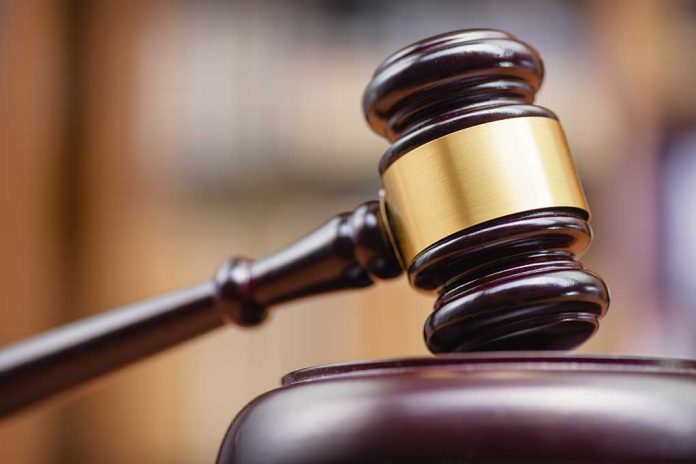
Federal judge threatens criminal contempt charges against Trump administration officials for ignoring court orders in a deportation showdown that could reshape the boundaries of executive power.
Key Takeaways
- Judge James Boasberg initiated criminal contempt proceedings against Trump administration officials for continuing deportation flights to El Salvador despite a court order to stop.
- The administration used the 1798 Alien Enemies Act to justify deporting over 200 Venezuelans accused of gang membership to El Salvador in exchange for $6 million.
- The White House plans to appeal the judge’s decision while maintaining they did not violate any legitimate court order.
- The administration faces an April 23 deadline to explain their actions and comply with the original order to avoid contempt charges.
- This case represents a significant test of judicial authority against executive power, with potential far-reaching implications for governmental accountability.
Constitutional Showdown Over Border Security
A federal judge has found “probable cause” to hold Trump administration officials in criminal contempt for continuing deportation flights to El Salvador despite explicit court orders to halt them. Judge James Boasberg made the unprecedented decision after determining the administration willfully ignored his temporary restraining order that had demanded a 14-day pause on the deportations. The case centers on over 200 Venezuelan nationals who were deported to El Salvador under an agreement where the Central American nation received $6 million to accept the migrants, who the administration identified as gang members posing security threats to American communities.
The Trump administration utilized the Alien Enemies Act of 1798 as legal justification for the deportations. While the Supreme Court recently ruled this Act could be used for deportations, Judge Boasberg emphasized this does not grant the executive branch authority to ignore specific court orders. White House Communications Director Steven Cheung responded forcefully, stating: “We plan to seek immediate appellate relief.” The administration maintains that its actions were lawful and necessary to protect American citizens from those they describe as dangerous foreign nationals.
BREAKING: Left-Wing Activist Democrat Judge Boasberg RULES THERE IS PROBABLE CAUSE TO HOLD TRUMP ADMINISTRATION IN CRIMINAL CONTEMPT!
Boasberg's RULING COMES AFTER SUPREME COURT STRIPS HIM OF THIS CASE & RULES ALL HIS ORDERS IN CASE WERE LEGALLY DEFECTIVE & HE HAD NO JURISDICTION… pic.twitter.com/s3nzEbmUCL— John Basham (@JohnBasham) April 17, 2025
Judicial Authority vs. Executive Action
Judge Boasberg did not make his decision lightly, noting in his blistering ruling: “The Court does not reach such conclusion lightly or hastily; indeed, it has given Defendants ample opportunity to rectify or explain their actions. None of their responses has been satisfactory.” The judge further emphasized that the Constitution prohibits officials from willfully disobeying judicial orders, especially those from coordinate branches who have sworn to uphold it. This stance directly challenges the administration’s position that they have authority to determine which court orders have legitimacy.
“The Constitution does not tolerate willful disobedience of judicial orders — especially by officials of a coordinate branch who have sworn an oath to uphold it,” said Boasberg.
The administration has until April 23 to explain their actions and comply with the original court order to avoid formal contempt charges. Press Secretary Karoline Leavitt firmly rejected the judge’s characterization, stating: “The administration did not ‘refuse to comply’ with a court order.” This defense aligns with the White House position that they are acting within legal boundaries while fulfilling President Trump’s campaign promises to secure the border and remove those they consider threats to public safety.
Potential Consequences and Precedents
If the administration fails to satisfy Judge Boasberg’s demands, the case would enter uncharted legal territory. Criminal contempt proceedings against high-ranking administration officials are extremely rare. Legal experts note the Department of Justice would typically handle federal prosecutions, creating an unusual situation where they would be asked to charge their own colleagues. Judge Boasberg could potentially appoint a private attorney to prosecute if the DOJ declines, though this approach would face substantial legal challenges and likely trigger appeals to the Supreme Court.
“In my experience as a lawyer over the last 30 years, even the hint of being held in contempt by a judge is ordinarily enough in order to cause litigants to correct their behavior,” Mitchell Epner said.
The judge specifically addressed what he viewed as the administration’s dismissive attitude, highlighting a social media post retweeted by Secretary of State Marco Rubio that featured El Salvador’s President joking about the court order with laughing emojis. Boasberg warned that allowing officials to “freely annul” court orders would make a “solemn mockery of the Constitution itself.” President Trump has directly criticized Boasberg on social media, calling for his impeachment and maintaining that his administration’s immigration enforcement actions are essential for national security.
Sources:
- US judge says he could hold Trump administration in contempt of court
- Here’s what happens if Judge Boasberg holds Trump administration in contempt over El Salvador deportations – CBS News
- Judge Opens Criminal Contempt Proceedings Against Trump Officials | HuffPost Latest News




